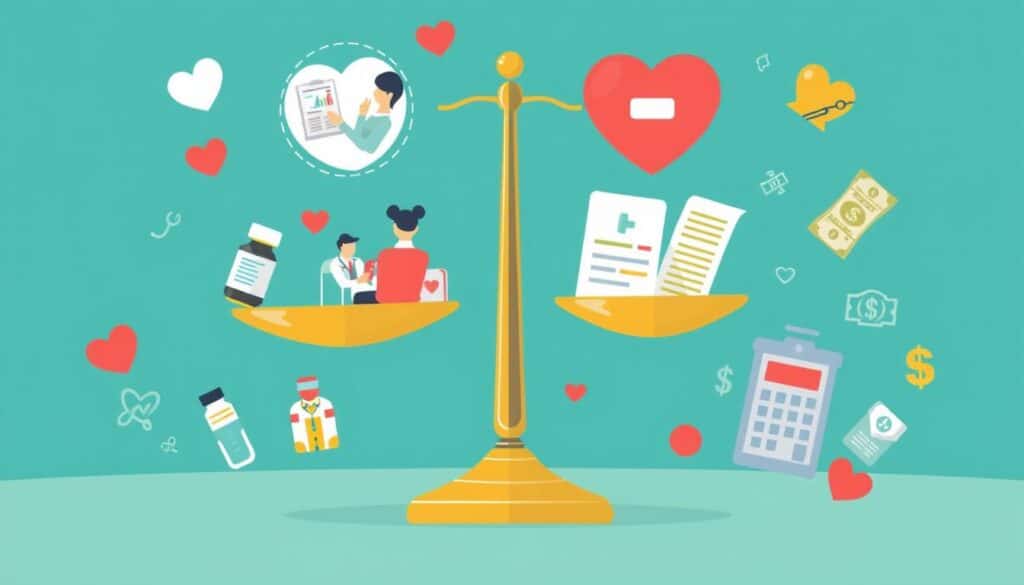Preventive healthcare means taking steps to stop diseases, disabilities, and early deaths before they happen. This approach is key to staying healthy and lowering the chance of serious health problems. The Healthy People 2030 initiative says that screenings, check-ups, and vaccines are vital for everyone’s health.
But, many people in the U.S. don’t get the care they need. This is because of high costs, not having access to doctors, and not knowing about the services available.
Key Takeaways
- Preventive healthcare focuses on preventing diseases and health issues before they occur.
- It includes services like screenings, check-ups, and vaccinations that help maintain overall health.
- Preventive care is crucial for reducing the risk of developing serious medical conditions.
- Many people in the United States do not receive the recommended preventive care due to barriers like cost, access, and awareness.
- Overcoming these barriers is essential for improving the overall health and well-being of the population.
Understanding Preventive Healthcare
Preventive healthcare means taking steps to stay healthy before problems start. It includes regular check-ups, screenings, and shots. These actions help find issues early, when they’re easier to treat.
Definition and Importance
It’s key because it lowers the risk of chronic diseases like heart disease and cancer. It also makes staying healthy easier and can cut healthcare costs.
Examples of Preventive Care Services
Services include yearly check-ups, cancer tests, and shots for adults and kids. They also cover screenings for high blood pressure and cholesterol. These steps help catch problems early and keep you healthy.
| Preventive Care Service | Importance |
|---|---|
| Annual Physical Exam | Helps identify potential health issues early and monitor overall well-being |
| Cancer Screenings | Enables early detection of certain types of cancer, improving treatment outcomes |
| Immunizations | Protects against vaccine-preventable diseases and reduces the risk of infection |
| Blood Pressure and Cholesterol Screenings | Helps identify and manage conditions that can lead to heart disease and stroke |
Preventive healthcare is vital for staying well and fighting chronic diseases. By being proactive, you can live better and save on healthcare costs over time.
Preventive Healthcare: A Proactive Approach

Preventive healthcare is a proactive approach to maintaining and improving one’s health. It’s not about waiting for health problems to happen. Instead, it’s about taking steps to avoid diseases and health issues before they start. This preventive healthcare approach means regular check-ups, screenings, and making healthy lifestyle changes.
By focusing on prevention, people can control their health and lower the risk of serious illnesses. Preventive care includes many services, such as:
- Annual physical exams
- Routine cancer screenings (e.g., mammograms, colonoscopies)
- Immunizations and flu shots
- Chronic disease management (e.g., diabetes, hypertension)
- Healthy lifestyle counseling (e.g., nutrition, exercise, stress management)
These preventive healthcare services help keep people healthy and ease the load on healthcare. Catching problems early or preventing them saves money and improves health outcomes for patients.
“Preventive healthcare is the best investment we can make in our health. By taking proactive steps, we can avoid the costs and complications of chronic illnesses and live healthier, happier lives.”
Choosing a proactive approach to healthcare through preventive care is wise and effective. It helps stay healthy and lowers the risk of serious health issues. By putting prevention first, people can take charge of their health and live better.
Cost Benefits of Preventive Healthcare

Investing in preventive healthcare can save a lot of money. It helps find and treat health issues early, before they cost more. Many services like check-ups, cancer screenings, and shots are fully covered by insurance. This means there are no out-of-pocket costs for you.
This makes it easier for people to get these important services. It can lead to lower healthcare costs and better health.
No Out-of-Pocket Costs
Many preventive care services are covered fully by insurance. So, you won’t have to pay anything out-of-pocket for them. This makes taking care of your health more affordable for everyone.
Using these free services can save you money later. It can also improve your health and well-being.
“Preventive healthcare is an investment in our health that can pay dividends for years to come. By catching issues early and taking proactive steps, we can avoid the high costs and complications of more serious medical conditions.”
Preventive healthcare also has long-term benefits for individuals and the healthcare system. It keeps you healthy and prevents chronic conditions. This means you won’t miss work, go to the hospital, or face high medical bills.
This leads to more productivity, less absenteeism, and lower insurance premiums. It helps both employers and employees.
Preventive Healthcare
Preventive healthcare is key to staying healthy and lowering the risk of serious illnesses. By acting early to prevent diseases, people can boost their health, cut healthcare costs, and live better lives. Services like regular check-ups, screenings, and shots are vital for staying healthy and easing the healthcare system’s load.
The value of preventive healthcare is huge. It lets people take charge of their health, catching and treating problems early. This can stop bigger, more expensive health issues later. It’s good for both the person and the healthcare system, easing the strain on resources and costs.
Preventive Care Services: Safeguarding Your Health
Some top preventive care services are:
- Annual physical exams and wellness checkups
- Routine cancer screenings (e.g., mammograms, colonoscopies, Pap smears)
- Immunizations and flu shots
- Chronic disease management (e.g., monitoring for diabetes, high blood pressure)
- Lifestyle counseling (e.g., nutrition, exercise, smoking cessation)
Adding these preventive healthcare services to your routine helps you stay healthy. It leads to better long-term health and lowers the risk of serious illnesses.
“An ounce of prevention is worth a pound of cure.” – Benjamin Franklin
Choosing preventive healthcare is smart for both individuals and the healthcare system. It lessens the healthcare burden, leading to lower costs and better health outcomes for everyone.
Overcoming Barriers to Preventive Care

Many people struggle to get preventive healthcare, even though it’s very important. The main problems are the cost, not having enough doctors, and not knowing why it’s important.
Addressing Cost, Access, and Awareness Barriers
Cost is a big hurdle. Without good health insurance, many can’t pay for check-ups and screenings. We need to work on making healthcare coverage better. This way, everyone can afford preventive care.
Not having enough doctors is another big problem, especially in poor areas. We should make it easier to find and book doctor visits. This will help more people get the care they need.
Many people don’t know why preventive healthcare is important. We can change this with education and outreach. Teaching people about the benefits of check-ups and screenings will encourage them to take care of their health.
By tackling these issues, we can make sure more people get the care they need. This will lead to better health for everyone in the long run.
Also Read: Discover the Top 5 Best Hospitals in India for World-Class Healthcare
Conclusion
Preventive healthcare is key to staying healthy and lowering the risk of serious illnesses. By acting early to prevent diseases, people can boost their health, cut healthcare costs, and live better lives. Services like regular check-ups, screenings, and shots are vital for staying well and easing the healthcare system’s load.
But, many people struggle to get these services because of cost, limited access to doctors, and not knowing how important they are. We must tackle these issues to help more people use preventive care and see its benefits. By doing so, we can help people take control of their health and adopt a proactive healthcare approach.
To wrap it up, preventive healthcare is crucial for better health for both individuals and society. We need to remove the obstacles that stop people from getting these vital services. This will lead to a healthier and more sustainable healthcare system for everyone.
FAQs
Q: What is considered preventive care?
A: Preventive care refers to health services that aim to prevent illnesses or diseases rather than treating them after they occur. This includes regular check-ups, immunizations, and screenings to detect potential health issues early.
Q: What types of screenings are part of preventive health care?
A: Screenings that are part of preventive health care include routine blood pressure checks, cholesterol tests, cancer screenings like mammograms and colonoscopies, and other tests designed to identify health conditions before symptoms develop.
Q: Why is preventive medicine important?
A: Preventive medicine is important because it helps identify risk factors and health issues before they become serious. By focusing on preventive measures, individuals can maintain better health, reduce healthcare costs, and improve overall quality of life.
Q: How often should I have a preventive care visit?
A: The frequency of preventive care visits can vary based on age, health history, and risk factors. Generally, adults should have an annual check-up, but specific recommendations may differ based on individual health needs.
Q: What are the benefits of preventive care?
A: The benefits of preventive care include early detection of diseases, lower healthcare costs, improved health outcomes, and increased lifespan. Preventive services can also lead to a better understanding of personal health and wellness.
Q: Are preventive tests covered by health insurance plans?
A: Most health insurance plans cover preventive tests as part of their preventive health care services. However, it’s essential to check with your specific health plan to understand which preventive services are covered and any associated costs.
Q: What role does a primary care provider play in preventive health care?
A: A primary care provider plays a crucial role in preventive health care by offering routine care visits, managing health screenings, and providing guidance on lifestyle changes to help you stay healthy. They also coordinate care and refer you to specialists when necessary.
Q: How can I learn more about preventive health services?
A: You can learn more about preventive health services by consulting with your primary care provider, visiting reputable health organizations’ websites, or reviewing resources from the Centers for Disease Control and Prevention (CDC) that focus on preventive measures and health promotion.
Q: What common health conditions can preventive care help address?
A: Preventive care can help address various health conditions, including cardiovascular disease, diabetes, and certain cancers such as colorectal cancer. Regular screenings and assessments can detect early signs of these conditions, allowing for timely intervention.
Source Links
- https://www.ncbi.nlm.nih.gov/pmc/articles/PMC7995942/
- https://www.healthpartners.com/blog/preventive-care-101-what-why-and-how-much/
- https://health.gov/healthypeople/objectives-and-data/browse-objectives/preventive-care